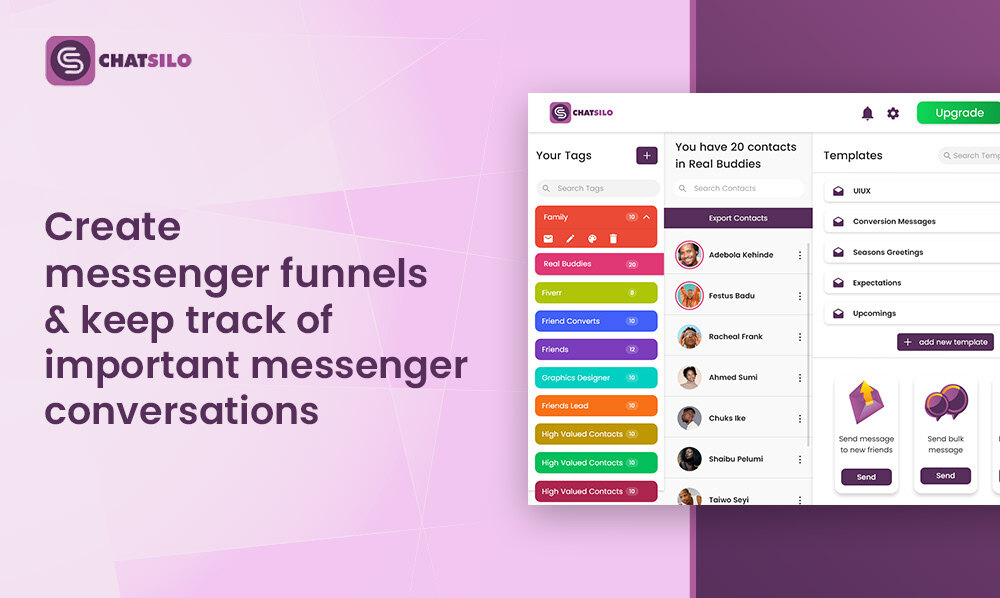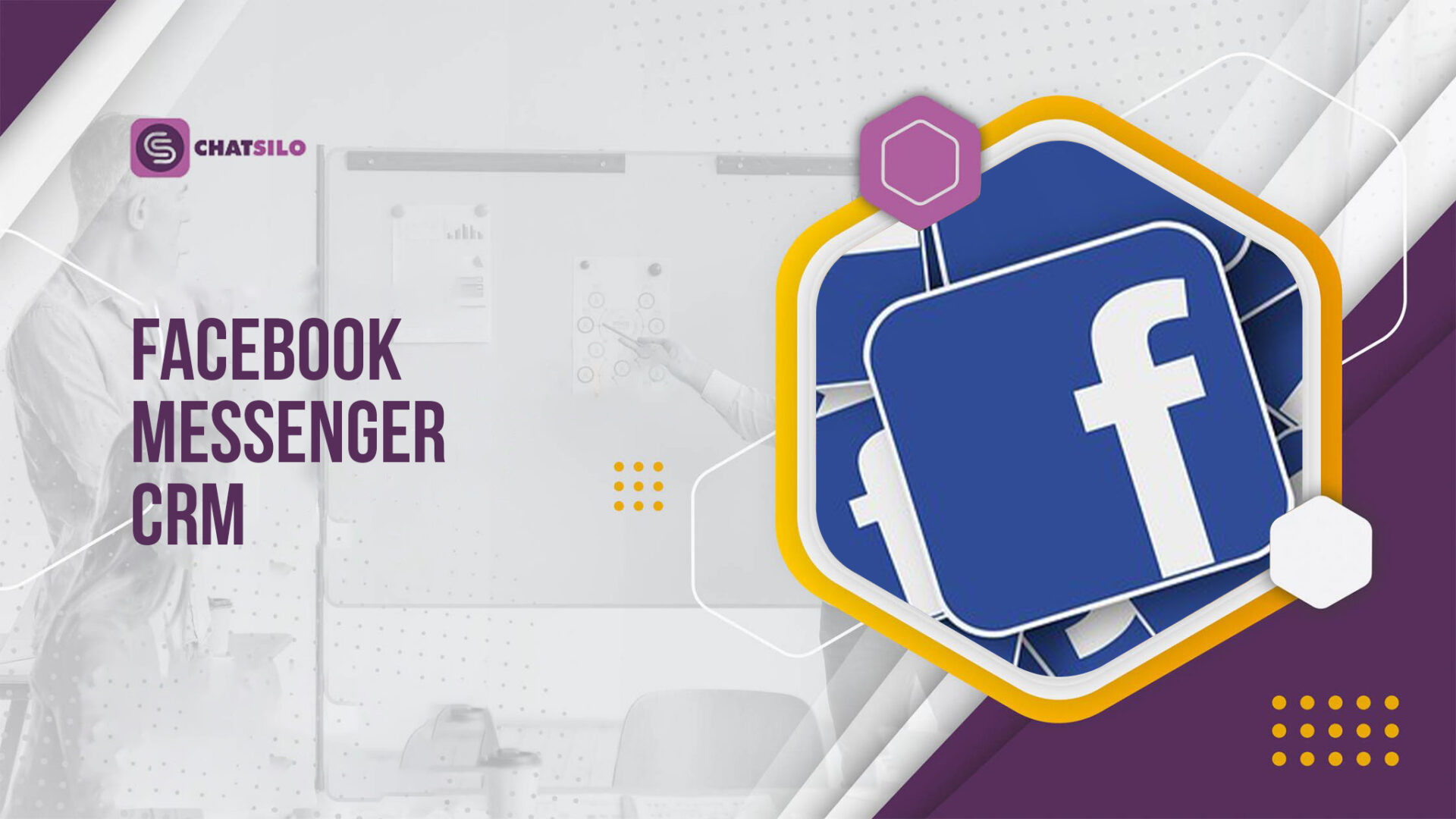Harnessing the potential of Facebook Messenger CRM has become crucial for organizations trying to improve customer relationship management in today’s fast-paced digital environment.
In-depth explanations of Facebook Messenger CRM’s features, advantages, and impact on how businesses engage with customers are provided in this article.
CRM has always been a crucial component of every successful company, and the emergence of social media platforms has fundamentally altered how companies connect with their clients.
Businesses now have a great and effective way to engage with their customers, thanks to Facebook Messenger CRM. This article will examine Facebook Messenger CRM’s features, advantages, and potential to improve your business relationships.
What is Facebook Messenger CRM?
The innovative Facebook Messenger CRM solution integrates the well-known messaging service with customer relationship management (CRM) features. You can manage customer interactions, simplify communication, and improve relationships with your audience by incorporating Facebook Messenger into your CRM system.
Facebook Messenger CRM’s capacity to improve the customer experience is among its most crucial features. Due to its extensive usage and simplicity, the platform is a fantastic medium for businesses to interact with their clients in real time. As a result, customers can receive prompt service, individualized help, and a smoother support procedure.
Another crucial factor is how Facebook Messenger CRM can improve productivity and efficiency. Businesses may preserve high levels of customer satisfaction while saving significant time and resources by automating regular processes like lead qualification, follow-ups, and customer support.
Furthermore, integrating Facebook Messenger with CRM platforms offers insightful information and data tracking possibilities. Businesses can use this data to study consumer behavior, tastes, and feedback, which can help them develop their marketing and sales strategy.
Facebook Messenger CRM is a customer relationship management system that leverages the power of Facebook Messenger to facilitate communication between businesses and their customers.
It allows businesses to manage customer interactions, track leads, close sales, and provide customer support within the same platform.
A Brief Overview of How a Facebook Messenger CRM Can Benefit Businesses
Using Facebook Messenger as a CRM tool can provide businesses with numerous benefits, including increased efficiency, improved customer experience, and better insights into customer behavior.
This benefit can lead to stronger relationships and, ultimately, greater customer loyalty.
Facebook Messenger CRM is a cutting-edge solution that enables organizations to enhance customer relationship management. It does this by supplying a user-friendly platform for real-time communication, increased efficiency, and insightful data.
Businesses can get an advantage over rivals and improve the overall customer experience using Facebook Messenger CRM.
Importance of Using Facebook Messenger as a Customer Service Channel
As more and more people use Facebook Messenger for everyday communication, it has become increasingly crucial for businesses to tap into this platform as a customer service channel.
By utilizing Facebook Messenger CRM, businesses can engage with their customers more personally and conversationally, fostering stronger relationships and improving overall customer satisfaction.
Ubiquity and Accessibility
With over 1.3 billion monthly active users, Facebook Messenger is among the most popular messaging platforms globally. Using Messenger as a customer service channel, businesses can easily reach and communicate with many potential customers.
Furthermore, since Messenger is available on various devices, including smartphones, tablets, and desktop computers, customers can easily access support anywhere.
Real-Time Communication
Facebook Messenger enables real-time, instant communication between businesses and their customers. This allows for faster issue resolution and more efficient support, leading to increased customer satisfaction.
Additionally, real-time communication fosters a more personal connection between customers and businesses, which can result in stronger relationships and brand loyalty.
Personalization and Segmentation
Facebook Messenger CRM allows businesses to personalize customer interactions and segment them based on preferences, purchase history, or other relevant data.
This level of personalization leads to more targeted and effective communication, making customers feel valued and understood. Personalized interactions can also contribute to higher conversion rates and better customer retention.
Integration With Chatbots and Automation
Businesses can use chatbots and automation tools within Facebook Messenger to handle common customer inquiries and support requests. This saves time and resources and ensures that customers receive immediate assistance, even outside business hours. By automating routine tasks, customer service agents can focus on more complex issues, improving the overall support experience.
Analytics and Insights
Facebook Messenger CRM provides businesses valuable data and insights into customer behavior and preferences. This information can be used to optimize customer interactions, create targeted marketing campaigns, and identify areas for improvement within the customer journey. By leveraging these insights, businesses can make data-driven decisions to enhance customer service strategies and drive growth.
Setting Up Facebook Messenger CRM
A seamless and effective Facebook Messenger CRM system is crucial to the success of your business. To set it up, follow these steps:
1. Identify the Purpose of Your CRM
The first step in setting up your Facebook Messenger CRM is determining its primary purpose. Depending on your business goals, your CRM can serve multiple functions:
- Nurturing Leads: Attract potential customers and guide them through buying by sharing relevant information and addressing their concerns.
- Closing Sales: Assist prospects in purchasing your product or service by addressing objections and following up on their inquiries.
- Customer Support: Provide efficient and personalized customer support, ensuring their satisfaction and building loyalty.
- Market Research and Product Feedback: Collect valuable customer insights and feedback to improve your products or services and make informed business decisions.
2. Identify the Stages of Your Messenger Funnel
Once you’ve determined the purpose of your Facebook Messenger CRM, it’s essential to map out the stages of your messenger funnel.
This realization will help you tailor your communication strategy for each step of the customer journey:
Nurturing Leads
a. New lead: Welcome and engage with potential customers who have shown interest in your product or service.
b. Problem awareness: Address your customers’ problems and position your product or service as the solution.
c. Solution aware: Share more detailed information about your product or service and how it can resolve their specific issues.
d. Product Awareness: Highlight the unique features and benefits of your offering, setting you apart from competitors.
Closing Sales
a. Ready to buy: Address any last-minute concerns or questions and guide customers through purchasing.
b. Objection: Overcome any objections or hesitations to make the sale.
c. Follow up: Maintain communication with prospects who may still need to complete a purchase, re-engaging them and providing additional information.
Customer Support
Categorize customers based on their purchased plan, allowing personalized and efficient support.
Market Research and Product Feedback
Engage with customers to gather feedback and insights on your products or services.
3. Enabling Messenger as a Communication Channel
To make the most of Facebook Messenger CRM, ensure that Messenger is enabled as a primary communication channel on your Facebook page. This will allow customers to quickly contact your business and receive timely support through the platform.
4. Choosing Automation Tools or Third-Party CRM Software
To streamline your Facebook Messenger CRM process, consider using automation tools or third-party CRM software like Chatsilo. These tools can help you manage customer interactions more efficiently, provide personalized responses, and track essential data to optimize your communication strategy. Choosing the right software for your business can significantly enhance your CRM efforts and drive meaningful results.
Best Practices for Using Facebook Messenger CRM
To implement Facebook Messenger CRM fully, businesses must adhere to best practices that produce compelling and engaging customer interactions.
You can maximize your use of Facebook Messenger CRM to deliver genuinely memorable client experiences by following the following recommendations.
Be Aware of the Messenger Funnel
Building solid relationships with your clients requires creating a well-planned route for them. From nurturing leads to offering continuous assistance, adjust your content and interactions to your audience’s needs at each funnel level.
By comprehending their path, you can communicate with your audience in a way that resonates with them and motivates them to take the appropriate actions.
Being Timely and Receptive
In today’s quick-paced world, clients demand immediate and effective service. By offering real-time communication, Facebook Messenger CRM can assist you in living up to these expectations.
Prioritize responding to client questions as soon as possible to show that you care about their needs and give them a sense of value.
Customizing Responses
Personalize your messages for each client to make the encounter engaging. Customer relationships are strengthened by personalized meetings that help them feel heard and valued.
Utilize the information offered by Facebook Messenger CRM to learn more about client preferences and behavior to give specialized content and support.
Maintaining a Conversational Tone
In your conversations, maintain a warm, open tone that puts customers at ease and promotes open discussion. Instead of using overly formal or technical terminology, establish a welcoming environment that helps your consumers feel at ease and understood.
Following these best practices, you can use Facebook Messenger CRM to build strong, engaging, and valuable customer interactions. This will assist you in making closer connections with your audience, ultimately resulting in higher customer satisfaction, loyalty, and commercial success.
Examples of Successful Facebook Messenger CRM Implementations
Harnessing the power of Facebook Messenger CRM has led to incredible success stories across various business types and sizes. By implementing this innovative tool in diverse ways, businesses have unlocked the potential to nurture leads, close sales, and provide exceptional customer support.
Here are some compelling examples that showcase the versatility of Facebook Messenger CRM:
Nurturing Leads
A small business owner in the health and wellness industry utilized Facebook Messenger CRM to engage with potential clients by sharing helpful tips, promotional offers, and personalized product recommendations. This proactive approach fostered trust and rapport, turning casual visitors into loyal customers.
Closing Sales
A large corporation specializing in B2B software services leveraged Facebook Messenger CRM to streamline its sales process. The sales team could focus on closing deals by automating lead qualification and follow-ups, resulting in increased conversions and revenue.
Customer Support
An e-commerce business offering eco-friendly products used Facebook Messenger CRM to revolutionize customer support. They achieved high customer satisfaction and brand loyalty by providing real-time assistance, addressing concerns, and resolving issues promptly.
Market Research and Product Feedback
A tech startup employed Facebook Messenger CRM to gather feedback from early product adopters. They gained insights that informed product development and marketing strategies by engaging in open dialogue and asking targeted questions.
These examples highlight the transformative impact of Facebook Messenger CRM across various business scenarios. By implementing this versatile tool, companies can foster stronger customer relationships, optimize their processes, and achieve remarkable success.
Final Thoughts
As explored throughout this article, Facebook Messenger CRM offers many advantages for businesses striving to excel in the digital landscape. By integrating this innovative tool into your operations, you can experience improved customer experiences, increased efficiency, and valuable insights that inform your strategies.
The importance of using Facebook Messenger CRM cannot be overstated. It can revolutionize how you engage with customers, nurture leads, close sales, and provide support, ultimately driving business growth and success. Implementing Facebook Messenger CRM is a game-changing decision for businesses looking to enhance their customer relationship management.
In conclusion, we highly recommend businesses of all sizes and industries to embrace Facebook Messenger CRM and unlock its full potential.
As a final call to action, consider using Chatsilo. This powerful third-party CRM software can help you streamline your Messenger interactions and automate processes, allowing you to focus on what matters most: building solid and lasting relationships with your customers.
Leap and transform your business with Facebook Messenger CRM – the future of customer relationship management is here, and it’s waiting for you to seize the opportunity.


